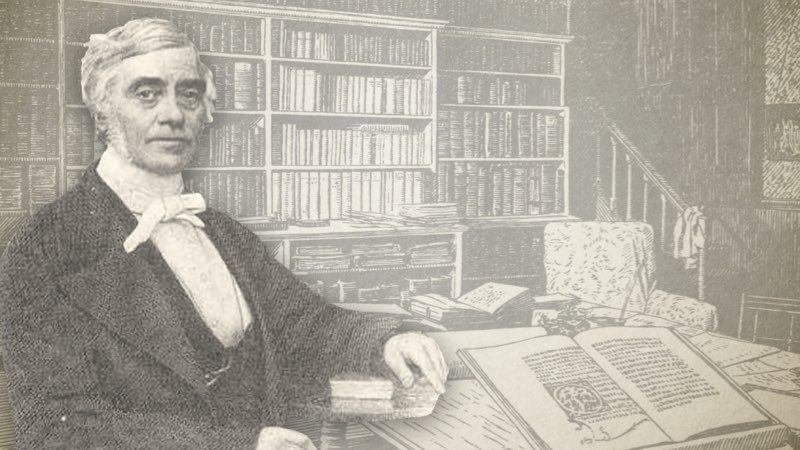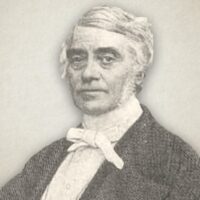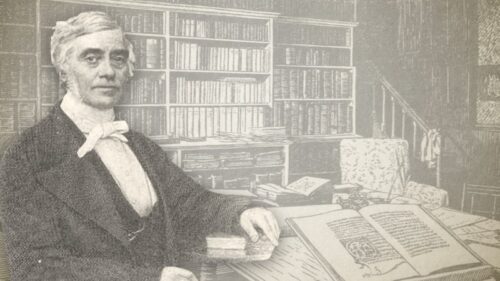
An Array Of Godly Counsel
September 23, 1831
My dear Mrs. Rackham,—Grace, mercy, and peace be multiplied unto you from God the Father and Jesus Christ our Lord. I take the opportunity of my friend and brother Mr. Tiptaft’s meeting me in London to send you a few lines to express my remembrance of and affection towards you in the Lord. I trust, during the season that has past since I saw you, that you have been enabled to trust in Him, who of God is made unto us wisdom, righteousness, sanctification, and redemption. I hope the Lord has shown you more and more of His cleansing blood and justifying righteousness, and given you faith to look to the one and lay hold of the other. To feel our deep need of forgiveness and reconciliation is God’s gift; to see that there is a Savior provided, who by His life and death put away sin and brought in everlasting righteousness, is God’s gift; to lay hold of and believe on this Savior, so precisely suited to our lost and condemned state, is God’s gift.
The whole plan and scheme of redemption in its first devising, after execution, and individual application to the heart and conscience of the child of God is, from first to last, the work of God the Father, Son, and Holy Spirit. This is a truth of which we should be deeply and firmly persuaded. We must learn and feel our lost and helpless state as sprung from our Covenant Head, Adam, by natural generation. We must be deeply and inwardly persuaded that we are utterly dead and powerless in consequence of this original sin of Adam, in which we are involved by being in him at the time of his fall, and that we have neither will nor power to see, relish, or believe the things of the Spirit of God.
This conviction, applied by the Holy Spirit to our hearts, will stir us up to earnest prayer that the eyes of our understanding may be enlightened, that we may have the truth, as it is in Jesus, applied to our souls with power and the Holy Spirit, and much assurance, and that we may have an experimental divine faith in the Person and work of the Son of God wrought in our souls. I trust the Lord has shown you this, and thus stirred you up to true and earnest prayer that you may have the truth brought home to your soul by the Holy Spirit, and are desirous to experience all the powerful teachings of the Lord the Spirit, though the word of God in His hands should even, as in the Virgin Mary (Luke 2:35), be a sword to pierce your own soul, and divide asunder soul and spirit, and the joints and marrow, by discerning and revealing the thoughts and intents of the heart (Heb. 4:12). I mean by this that through grace you are willing to have the secret chambers of your heart laid open to your view, and be stripped of your own righteousness, that you may learn only to glory in the Lord. We must come to this, if we hope to be saved, and earnestly seek the Spirit’s teachings, whatever sharp lessons He may teach us, and however He may humble us in our own sight.
Through mercy, my health is much recovered, though my chest continues weak, and is soon irritated by exertion; my general health is much restored, and I feel stronger and less nervous than I did at Stadham. The sea air has, through God’s blessing, braced me, and, my chest excepted, I feel nearly as well, though not so strong, as before this attack. I was forced, by a concurrence of circumstances, to take an afternoon service a few Sundays back, as if I had not done so the church must have been either shut up, or served by a carnal minister. I was much helped at the time, and preached for nearly three-quarters of an hour, but suffered from it afterwards, my chest being weak and heated for two or three days. I trust that, during the interval which I have allowed myself for rest, it may please the Lord so far to restore me as to allow me to preach once more in the pulpits I have, through His mercy and providence, occupied among you.
I sincerely hope that during that time the Lord may teach and bless your present minister to the edification of many. Fail not to pray for him, that the Lord may speak in him and by him to the hearts of His people, and furnish him with food suitable to the weak and to the strong. I look to the prayer- meeting as a means of great good in the Lord’s hands. May He give a spirit of grace and supplication to its members, and lead them privately and publicly to intercede with Him for a blessing for minister and people. Those who do not pray aloud in these meetings may plead earnestly with God, both at home and when assembled together, and these prayers He who searches the hearts will answer, if offered up by the Spirit who dwells in them.
Pray also that your own eyes, and the eyes of the church at Stadham and Chisleton, may be enlightened to discern the devices of Satan, and that that cruel wolf may not be allowed to rend the sheep. A praying church and a watchful church must flourish. When it becomes cold and lukewarm, when prayer is restrained and it ceases to be watchful, then the great adversary gains an advantage, and everything that is miserable creeps in, to the grief of God’s children, to the joy of the world, and to the destruction of souls. Do not be unmindful that you have a God to glorify by your holy life and conversation, especially as being the mother and mistress of a family, before whom you should let your light shine, that they may see there is a truth, reality, and power in religion, and that it is not a mere change of opinions.
I was glad to hear Mr. B— has borrowed a religious book of Mr. Brenton. In your conversations with him I would have you avoid all disputes about election and such doctrines, and speak rather of such subjects as our natural sinfulness and condemnation, the necessity of having Christ for our perfect Savior, the efficacy of His blood and His blood alone, and the need of embracing this by faith, together with the necessity of being born again and being taught of God. Such subjects will either be so distasteful that he will cease to speak upon them, or will be of use to him. Disputes about election will only harass your own mind, and stir up in him a mere spirit of carnal reasoning which will only do him harm. Seek wisdom from the Lord to direct you, and speak in His strength only, and not your own. But a holy, self-denying, and separated life is the best preacher.
I trust that, with respect to your temporal concerns, the Lord is teaching you the meaning of that text, Matt. 6:33, 34. Read the whole of that chapter, from verse 19 to the end, and seek of the Lord faith to believe and feel it in all its truth and power. Read also what the Apostle says to Timothy, 1 Tim. 6:6-16. Observe how God there tells us to be content with food and clothing, and declares that godliness with contentment is great gain. See what he says of those that desire to be rich; how that they err from the faith, and pierce themselves through with many sorrows, and bids the man of God flee these things, and follow after righteousness, godliness, faith, love, patience, and meekness; and bids him keep this commandment without spot, unrebukeable, until the appearing of our Lord Jesus Christ. There is much instruction in these words if the Lord is pleased to seal it home on your heart and make it a principle of action. Let me advise you, my dear Mrs. Rackham, to be much in reading the Scriptures. Be like the Bereans, and search the Scriptures daily, Acts 17:11, and like David, Psalm 119:11, 97, 105, 140, 162, where he expresses his delight in God’s word. See also the character given of the righteous man, Psalm 1 verse 2. Pray earnestly that the word may be wrought into your heart, that its precepts, truths, and promises may be the comfort of your days and nights, the motive of your actions, and the guide to all your ways. Remember that the Lord has helped you through many afflictions, and turned them into blessings; and so He will be ever with you, to keep, guide, and bless you. Only trust in Him.
Do not hanker after this wretched world, or desire its honors and riches for yourself or your children. Give them up to the Lord, and ask Him to put them into such situations of life as may be for their spiritual good and for His glory; and be willing that they should be poor and despised, if it be His will. Seek also earnest blessings for the church where you live and the Church of Christ in general, that the Lord may pour out His blessing richly upon it. Seek for a spirit of humility, faith, and love, and avoid everything that may produce contrary feelings in the brethren. Set your face against everything that is ungodly and profane, wherever you may meet it; and in the regulation and management of your own household act as a Christian mistress and a Christian mother. A Gospel practice is the only outward proof of a Gospel faith, and wherever the principles of God’s word are wrought into the heart they must and will produce the fruits of holiness and godliness in the life and conversation.
I hope Elizabeth is able still to attend the Sunday-school, and that her class is improving. I would not wish her to set the children too long lessons, as I would sooner they should learn accurately and well, than much. And I would wish her to consider the different ages and capacities of the children, and set them their tasks accordingly. I do not like that they should learn to hate school, and what they are there taught, as it may have an unhappy influence all their days; and the way to teach them to love school and their teachers is by giving them to learn what they are able to accomplish easily, and by treating them with the greatest kindness and gentleness, and yet due strictness and severity, if needful.
Believe me to be,
Your affectionate Friend in the Lord Jesus,
J. C. P.
Joseph Philpot (1802-1869) was a Strict and Particular Baptist preacher. In 1838 he was appointed the Pastor of the Churches at Oakham and Stamford, during which time he became acquainted with the Gospel Standard. In 1849, he was appointed the Editor for the Gospel Standard Magazine, a position he held for twenty-nine years (nine years as joint Editor and twenty years as sole Editor). John Hazelton wrote of him—
“A man of great grace, profound learning, and with a literary style equal to any of his contemporaries. For twenty years he was editor of the "Gospel Standard," in which his New Year's Addresses, Meditations, Reviews, and Answers to Correspondents were outstanding features. His ten volumes of sermons, entitled "The Gospel Pulpit," and his four volumes of "Early Sermons," testify to his powers as an expositor of the Word, to the beauty of his illustrations, and the heart-searching character of his ministry. He was born at Ripple, Kent, where his father was rector, and educated at Merchant Taylor's and St. Paul's schools, entering at Oxford University in 1821, taking a first-class, and ultimately becoming Fellow of his College. He accepted an engagement in Ireland as a private tutor, but prior to his departure he was unexpectedly detained at Oakham. There he bought a book, "Hart's Hymns," and was much struck by the beauty of many of them. In 1827, in Ireland, eternal things were first laid upon his mind, and "I was made to know myself as a poor lost sinner, and a spirit of grace and supplication poured out upon my soul." He returned to Oxford in the autumn, and "the change in my character, life, and conduct was so marked that everyone took notice of it." Early in 1828 he was appointed to the perpetual curacy of Chislehampton, with Stadhampton—or Stadham—not far from Oxford. He soon gained the love and esteem of his parishioners. His Church was thronged, and his labours were unceasing amongst young and old. In 1829 he became acquainted with William Tiptaft (1803-1864), vicar of Sutton Courtney, and a friendship commenced which death alone severed. Both ministers had been led to know the truths of predestination and election and the final perseverance of the saints, and preached them with unflinching boldness. Persecution soon arose; it always does in some quarter when there is a faithful ministry. In 1831 Tiptaft built a chapel at Abingdon, where he remained as a Baptist pastor until his death. In 1835 Mr. Philpot resigned his living and his fellowship; the temporal sacrifice entailed was such that he had to sell almost all his books. Soon after this momentous step had been taken he preached in a chapel at Newbury, which some of his friends had procured for the purpose. He writes: "When I therefore began to open up that God had a chosen and peculiar people the whole place seemed in commotion. One man called aloud, 'This doctrine won't do for me!' and started out, and was instantly followed by five or six others. I was not, however, daunted by this, but went on to state the truth with such measure of boldness and faithfulness as was given me. Some of my friends at the chapel thought that the people would have molested me, but no one offered to injure me by word or action, and I came safe out from among them." He also writes: “——is, I fear, something like the robin spoken of in 'Pilgrim's Progress, who can eat sometimes grains of wheat and sometimes worms and spiders. I am quite sick of modern religion; it is such a mixture, such a medley, such a compromise. I find much, indeed, of this religion in my own heart, for it suits the flesh well; but I would not have it so, and grieve it should be so." He preached much at Allington, near Devizes, and in the Metropolis, and many other places. His ministry was attended by crowds, and was blest to saint and sinner. In 1838 he became Pastor of the Churches at Oakham and Stamford, residing in the latter town till failing health caused his removal to Croydon. At the time of his settlement at Stamford he became associated with the "Gospel Standard," and in 1849 he was appointed editor. He was a most interesting writer on the things of God. His sermons are experimental rather than doctrinal, but when he treated of doctrine it was in a comprehensive and scriptural way, as his "Meditations" amply prove. His book on "The Eternal Sonship" practically closed the controversy which gave it birth. His "Reviews" are most instructive and brilliantly written. Would that the younger members of our Churches made a study of them! "The Advance of Popery" was another work which had a wide circulation, and events today prove the accuracy of the forecasts so solemnly made therein. His "Letters" have been a means of grace to many, and it is refreshing through them to know the spiritual history of some of the excellent of the earth in their day and generation, and to have glimpses of services at Eden Street, Gower Street, and Great Alie Street Chapels, and at Came and other places, especially in Wiltshire.”
Joseph Philpot's Letters
Joseph Philpot's Sermons




